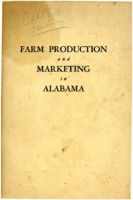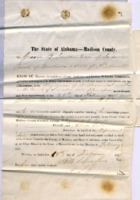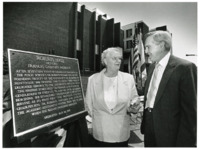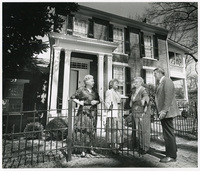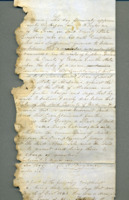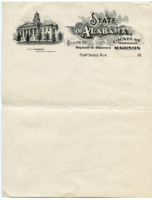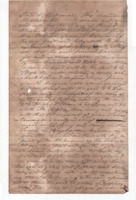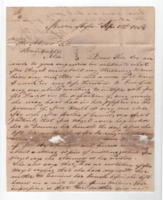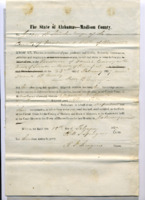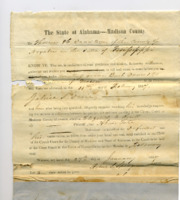
Browse Items (56 total)
Sort by:
-
Depositions of William Ashworth and Thomas O. Gill.
Ashworth and Gill are witnesses for the defendant, Abner Tate. Ashworth's deposition is first. He answers questions regarding Elizabeth Routt and her husbands, particularly of her character and what others said and thought of her. He includes at the end that he has heard of her destroying the lives of her husbands, stealing cotton by way of her slaves, and was accused of having one of her slaves shoot Abner Tate. Thomas O. Gill's deposition follows. He is asked about Elizabeth Routt and her husbands as well, including her character and what others said and thought of her. Gill also confirms hearing of the "great many charges alleged against her." Gill is then cross examined by the plantiff's, Elizabeth Routt, counsel. He is asked whether the charges against her character are of his knowledge or the publics'. Gill names those whom he heard the information from and admits that the charges were rumors rather than facts. He also details the pamphlet written by Abner Tate that he received from an unknown sender. He was also asked about the sicknesses of Routt's husbands and the attending physicians which he was unable to answer. -
Statement Letter of D. H. Bingham.
This is the statement of Daniel H. Bingham taken in December of 1855 regarding a murder that occurred in Alabama that occured in 1842. In his statement, D. H. Bingham accuses Abner Tate of the murder of one Jonathan K. Rier of Tuscaloosa. He also accuses Tate's slave, George Cabiness, of aiding and abetting in the committing of the crime. Following Bingham's statement, a statement of support is taken from Barbara Hazel placing a "stranger" in the home of Abner Tate the night of the murder. The next page is a second statement given by D. H. Bingham regarding the murder of Charles B. Sawyer of Coffee County, Tennessee and accusing Abner Tate and his slave, George Cabiness of the crime. His statement is followed by the witness, Barbara Hazel's statement that placed the victim in the home of Abner Tate. -
Deed of Samuel Conner.
This deed was created and finalized on June 19, 1843 between Samuel Conner and Elizabeth Routt (then High) following the death of her third husband, Alexander Jeffries. This indenture gives Samuel Conner a sum of two hundred and thirty seven dollars for a parcel of land. The land would be the Jeffries plantation that Elizabeth would live on until after the death of her sixth husband, Willis Routt, and following the dismissal of her lawsuit against Abner Tate. -
Letter to Abner Tate from William Conner.
This letter is William M. Conner's statement as written to Abner Tate. In this statement, Conner refutes Mrs. Hazel's testimony stating that he has never threatened to "cow hide" anyone. Furthermore, Conner writes that his wife "says most positively" that Mrs. Hazel never requested her to "examine her bundle the day before she left her mother's." -
Depositions of Daniel Curry and Polly Curry.
The depositions include the questions asked and the answer. Daniel Curry's deposition is first. The questions regard Elizabeth Routt and her husbands, particularly her third, Alexander Jeffries, whom Daniel Curry knew well. He details his death, claiming he saw him the day he died and he did not appear sick at that time. Later questions interrogate Curry about Routt's character and ability to murder her husbands. Polly Curry was asked the same questions as her husband. Her responses were similar. She stated that Routt was well thought of prior to the death of her third husband, Jeffries, the lost her good standing after that. Polly adds that she heard Routt say that she was glad her second husband was dead following his death and that she wished her last husband, Mr. Routt, was also dead so she could "live in peace." She also includes the rumors that Mrs. Routt was "too intimate" and charged with sleeping with two of her slaves, and had stolen cotton previously. -
Deposition of Dr. Gabriel S. Davies.
As a witness for the defendant, Abner Tate, Dr. Davies' deposition includes a list of the questions asked and the corresponding answers on the blue document. Davies is asked about Elizabeth Routt and her husbands, particularly Alexander Jeffries. Dr. Davies is asked his professional medical opinion about the cause of death to which he states was believed to be from "inflamation of the stomach and perhaps the bowels." Dr. Davies also states that he believed him to have been sick approximately six to eight weeks. He also compares the symptoms of Jeffries and Brown, Routt's fifth husband.
